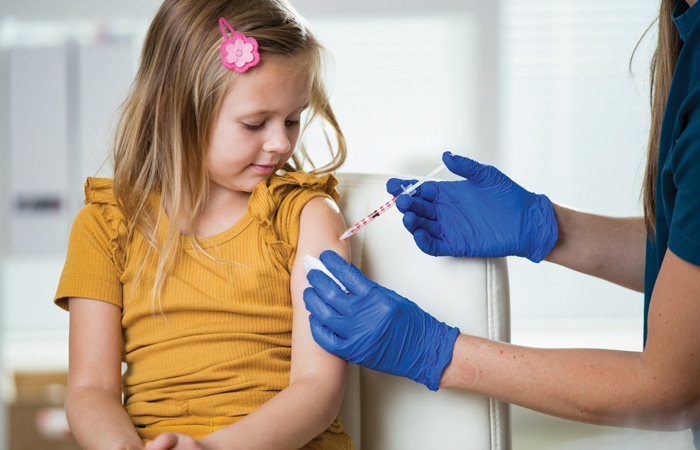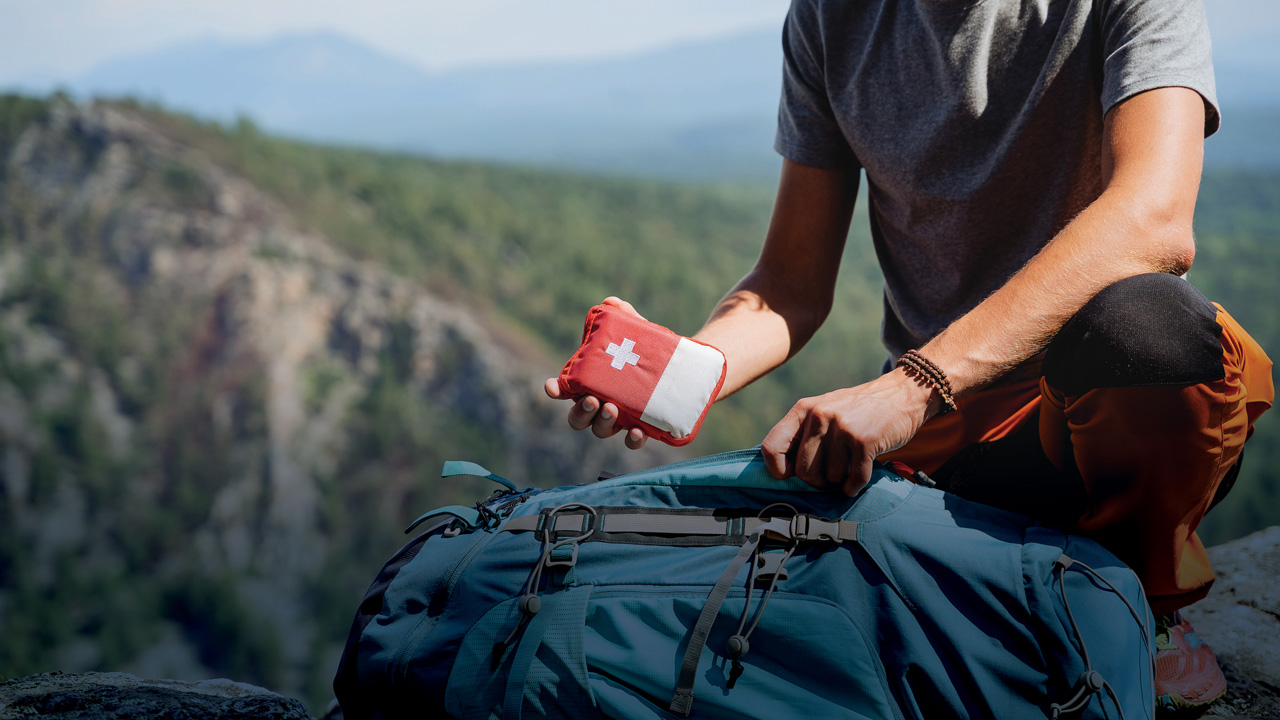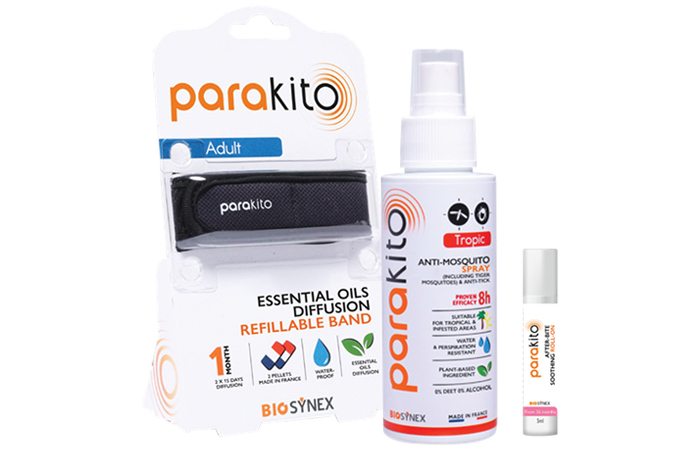In Conditions
Follow this topic
Bookmark
Record learning outcomes
In April 2025, the UK Health Security Agency (UKHSA)’s social media accounts were reminding travellers to make sure their vaccinations were up-to-date and that they had everything they needed to stay safe and healthy on holiday.
According to ABTA (The Travel Association)’s Travel Trends in 2025 report, there’s an increasing trend for long-haul travel in 2025, with growing numbers of people visiting countries in Asia, such as Japan, Thailand, India and China, along with African countries South Africa and Kenya.
Health risks vary from country to country and depend on who is travelling and the type of holiday planned.
Long-haul travel, or travel to very hot countries, often carries increased risks for holidaymakers, including sunburn and heat stroke, unfamiliar foods and infections, and an increased risk of insect bites and, in some places, malaria.
Packing a simple first aid kit, including certain over-the-counter medicines and other pharmacy products, can help customers self-manage many minor health concerns.
“Pharmacies and travel clinics offer pre-travel consultations to assist in determining what precautions might be necessary,” says Jacquie Lee, medication safety officer and information pharmacist at Numark.
“These consultations typically involve an assessment, which gathers information about the traveller’s medical history, travel plans and past vaccinations. It’s recommended to complete these consultations at least six to eight weeks before departure, ensuring enough time for any required vaccination schedules and for immunity to develop.”

Ensure your customers are aware of the recommended vaccines when travelling to certain countries.
Vaccinations
Wherever people are travelling, they should research the risks at their destination and any stopovers. Some travel vaccinations protect against infections that are most likely to be caught in long-haul destinations – such as yellow fever, hepatitis A and rabies. This applies particularly to people who are backpacking, camping, staying in hostels and/or travelling in rural areas.
Some vaccines take time to work or need several doses spread over a few weeks, so advance planning is key. Certain countries require proof of specific vaccinations (such as a yellow fever).
In April 2025, the UKHSA urged travellers to Saudi Arabia for the Umrah and Hajj pilgrimages to ensure they are vaccinated against meningococcal disease with the MenACWY vaccine. Saudi Arabia requires proof of MenACWY vaccination for pilgrimage visitors, as well as seasonal workers. Umrah can be performed at any time of year, other than during Hajj, which takes place in June this year.
“During Hajj and Umrah, millions of people gather in very close proximity during the pilgrim rights, in accommodation sites and on public transport,” says Dr Sahira Dar, president of the British Islamic Medical Association. “This means that there is a much higher risk of contracting infectious diseases such as meningitis, which is a serious illness.”
“The risk of developing a blood clot rises slightly after long-distance travel”
DVT risks
The risk of developing a blood clot (deep vein thrombosis – DVT) rises slightly after long-distance travel (usually travelling for more than four hours by air, car, bus or train). However, it’s important to reassure customers that the DVT risk is still very low in healthy people. Signs of a blood clot include swollen, painful legs (or leg) and/or breathing difficulties (suggesting the clot has spread to the lungs, causing pulmonary embolism).
Factors increasing the risk of a blood clot include being over 40, a family history of blood clots, previous DVT, obesity, pregnancy, blood clotting disorders, recent surgery and using oestrogens (oral contraceptives or HRT).
Anyone in a high-risk group should speak to their GP about travelling long distances, in case they need preventative measures such as anticoagulant medicines. Aspirin isn’t recommended for the prevention of travel-related DVT in otherwise healthy people.
Graduated compression stockings may help to reduce the risk of DVT. These aren’t available on NHS prescription, but can be bought from some pharmacies and travel clinics. “Wearing properly fitted graduated compression stockings, often referred to as flight socks, can significantly reduce the risk of DVT by improving blood flow in the lower legs,” says Jacquie.
“Pharmacy staff can assist customers in selecting the correct size and type. These are especially beneficial for individuals with varicose veins or other circulatory issues.”
Keeping mobile while travelling helps to maintain a healthy circulation. Pharmacy teams should recommend:
- Walking around the plane or train (or getting out of the car) every one to two hours
- Stretching the legs and ankles while sitting down
- Not crossing the legs for extended periods
- Drinking plenty of water before and while travelling
- Avoiding alcohol and caffeine.
Travel sickness
Travel or motion sickness can make long journeys uncomfortable and stressful. Caused by repeated movements that confuse the brain, it can trigger nausea or vomiting, along with dizziness, vertigo and headaches. The symptoms are common in children and can be worsened by reading or scrolling a phone screen.
To prevent and treat travel sickness, pharmacy customers should be advised to get fresh air whenever possible and sit on the most stable part of the vehicle, such as the front car seat, over the wings of a plane or midship on a boat. It may also help if they avoid heavy or greasy meals and alcohol before or during travel.
Some people find their symptoms improve with natural remedies such as ginger (in tea, capsules or biscuits) or acupressure wristbands. Travel sickness medicines are most effective when taken before the symptoms occur. These can interact with other medicines and alcohol, however, so it’s important to read product labels carefully.
“Hyoscine hydrobromide is considered one of the most effective treatments for motion sickness,” says Jacquie.
“Tablets should be taken 20-30 minutes before travel, while patches should be applied five to six hours in advance and can last up to 72 hours. However, hyoscine may not be suitable for everyone, particularly children under 10 or people with glaucoma.”
Sun safety
According to Cancer Research UK, almost nine in 10 cases of melanoma skin cancer in the UK could be prevented by staying safe in the sun and avoiding sunbeds. Even UK sunlight can lead to sunburn and increase the risk of skin cancer, including on cloudy days. To reduce the risk of sunburn, it’s important to avoid the sun when the UV rays are at their strongest, usually between 11am and 3pm from March to October.
Pharmacy teams should provide sun safety tips to customers and recommend suitable sunscreen products. “Customers should choose a broad-spectrum sunscreen with an SPF of at least 30 for UVB protection and a high UVA rating (look for 4 or 5 stars or the UVA logo in a circle),” says Jacquie Lee, medication safety officer and information pharmacist at Numark.
“Remind customers that sunscreen is not a substitute for protective clothing but rather a complementary measure. Wearing loose, long-sleeved clothing, a wide-brimmed hat and UV-protective sunglasses can significantly reduce UV exposure.”
Sunscreen should be easy to apply and comfortable to wear – if people don’t like how the product feels or smells, they’re not going to use it or reapply it regularly.
How well people apply sunscreen can be just as important as which one they use. The British Association of Dermatologists recommends applying a generous amount (at least six full teaspoons of sunscreen for an average adult). Sunscreen should also be:
- Applied 30 minutes before sun exposure or going outside
- Reapplied at least every two hours and after swimming, sweating or towel drying (this applies to once-a-day products too)
- Thrown away after its use-by date or if it’s been open for longer than the recommended time on the bottle.
If someone has mild sunburn, they should treat it by:
- Having a cool bath or shower or sponging the affected area with cold water
- Drinking plenty of fluids to prevent dehydration
- Reducing any pain with painkillers such as paracetamol or ibuprofen, if necessary
- Applying moisturising cream once it’s comfortable to do so
- Covering up and staying out of the sun until skin has fully healed.
If the skin is swollen or blistered or the person has a high fever, dizziness, headaches, nausea/sickness or chills, they should see a doctor as soon as possible.

Customers should be wearing a broad-spectrum sunscreen with an SPF of at least 30 to avoid sun damage.
Sickness and diarrhoea
Eating and drinking contaminated food or water can lead to digestive upsets. According to an article in the Journal of Travel Medicine, published in March 2024, most cases of travellers’ diarrhoea are mild, but around three percent of all travellers will experience symptoms that prevent usual activities or require medical attention.
Strict food and water hygiene is the main preventative measure, such as drinking only bottled, boiled or properly treated water, and steering clear of raw or undercooked meat, seafood, unpasteurised dairy products, and fruit, vegetables and salads washed in local water.
Mild travellers’ diarrhoea usually gets better on its own within three to five days. It’s important to drink plenty of fluids or use oral rehydration salt solutions, especially in hot climates.
“For more moderate symptoms, OTC medications such as loperamide can be used to reduce the frequency of bowel movements and help manage symptoms, particularly when travel plans can’t be delayed. However, these medications aren’t suitable for children under 12 and should not be used if the person has a fever or blood in their stools. Bismuth subsalicylate may also help with mild diarrhoea and nausea but should be used with caution and only for short periods.”
“Bite prevention involves applying good-quality insect repellent to all exposed areas of the skin”
Insect bites
Biting insects, such as mosquitoes, midges and ticks, flourish in the summer months, especially in parks and woodland areas. While most insects are merely a nuisance in the UK, in other countries some carry potentially life-threatening diseases, such as malaria and dengue fever.
In June 2024, the European Centre for Disease Prevention and Control (ECDC) highlighted the increasing spread of mosquito-borne diseases in EU and EEA countries.
Bite prevention involves applying good-quality insect repellent to all exposed areas of the skin and wearing clothing with long-sleeves and long trousers when possible. DEET 50% is the most effective insect repellent, recommended especially in malaria-endemic locations, but it can irritate the skin. Other types of insect repellents may be gentler on the skin but may not work as well.
Most insect bites and stings can be managed with self care. If customers think an insect bite may be infected, they can use the Pharmacy First service to see if they require an antibiotic. “For symptom relief, oral antihistamines such as cetirizine or loratadine can help with itching and swelling, while topical hydrocortisone cream may also be effective,” says Jacquie.
“Pain can be managed with OTC analgesics such as paracetamol or ibuprofen. If there are signs of mild infection, such as redness or warmth, patients should be advised to monitor the area and seek further care if symptoms worsen. The patient should be referred onwards if they’re systemically unwell, there’s severe pain out of proportion to the wound, or there’s significant collection of fluid or pus at the site of the infection.”
If customers are travelling to certain countries, they may need to take antimalarial tablets before and during their stay. Some antimalarials can be bought from pharmacies, but others need to be prescribed by a GP.
Recommended antimalarials vary for different destinations and even times of the year, because of drug resistance. Some tablets need to be started a few days before travelling, whereas others may need to be started a week or more beforehand.
It’s important to take the tablets regularly and to finish the full course, even after leaving the malaria zone. Antimalarials need to be continued for different lengths of time after travelling, depending on the specific medicine. Stopping the antimalarials early can lead to malaria infection.
Parakito is a natural, effective range of mosquito protection products ideal for travellers, says manufacturer BHR Biosynex. The anti-mosquito bracelets work by masking CO₂ emissions, making users less visible to mosquitoes, says the company. Combined with plant-based sprays, which have proven efficacy for eight hours and which is suitable for tropical and infested areas, roll-ons, and soothing after-bite treatments, the Parakito range provides comprehensive bite prevention and relief without harsh chemicals, adds the manufacturer.
BHR Biosynex: 02476 377210 / bhr.co.uk
Travelling with medicines
Fake medicines are a common problem abroad, so it’s important to pack sufficient supplies of usual medicines for the whole holiday, considering any unexpected delays, damage or loss. A GP can usually supply enough medicine for travel abroad for up to three months, if required.
Essential medicines (over-the-counter and prescribed) should always be carried in hand luggage. Travellers should take all their medicines in the original pharmacy packaging with the correct labelling and leaflets. Certain medicines (such as insulin) need to be carried in a cool pack or insulated pouch.
Rules around liquids in hand luggage vary between UK airports and airports abroad. If any medicines are in liquid form and in a container that’s larger than 100ml, customers should carry a letter from their doctor or a copy of their prescription. Syringes and needles should also be accompanied by a doctor’s letter.
Some medicines aren’t allowed to be brought into certain countries, or there may be specific rules to follow. This includes some anxiety medicines, strong painkillers or opiate substitutes and may even apply to some medicines that are available OTC in the UK.
If customers are taking a medicine that contains a controlled drug (in the UK or abroad), they should check the rules of the country they’re going to (usually through the foreign embassy in the UK). They will need to prove the medicine belongs to them with either a prescription or letter from their doctor.


